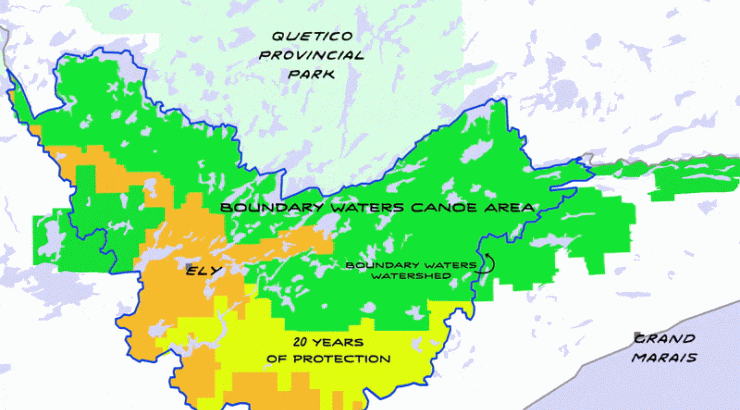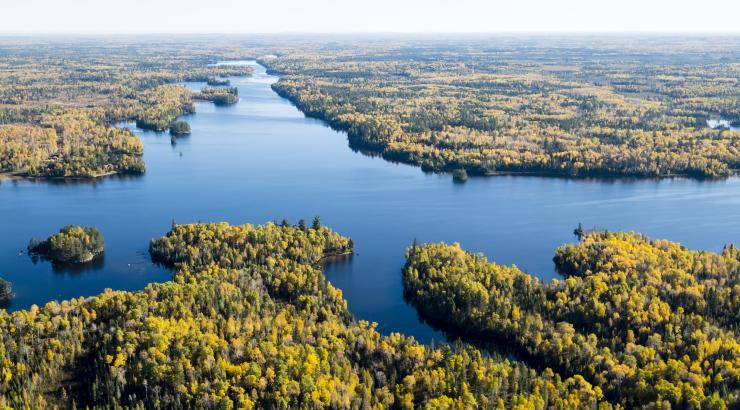There has been another attack on America’s most visited Wilderness. The U.S. Department of the Interior recently took another step to allow sulfide-ore copper mining on public lands next to the Boundary Waters: a decision that reinstates two expired mineral leases to the Chilean-owned mining company, Twin Metals Minnesota.
How did this happen and what does it all mean for you and our public lands? Read the Q&A below to find out.
Q: Wait. What just happened?
A: On May 2, 2018, the Department of the Interior and its agency the Bureau of Land Management (BLM) issued a decision that reinstated two expired mineral leases for the benefit of Twin Metals Minnesota, owned by Chilean mining giant Antofagasta. These leases give Twin Metals possession and control of approximately 5,000 acres of Superior National Forest lands for the end-purpose of mining. These mining activities include exploratory drilling, hydrogeological drilling, road building, construction of mining facilities, and the extraction of minerals for the profit of Antofagasta.
Q: What areas are these leases for?
A: One lease is immediately adjacent to the Boundary Waters near the Gabbro Lake area and the second lease is a few miles away. Both leases are along the South Kawishiwi River. One lease includes lands along Birch Lake.
Q: Why did they do this?
A: In 2016, the U.S. Forest Service declined to consent to the renewal of these leases because of the risk of harm to the Boundary Waters and the Superior National Forest. Twin Metals challenged the denial of its requests to renew old mining leases. Twin Metals claimed that it ‘owned’ the public’s minerals because it held two expired mining leases and therefore neither the Forest Service nor the BLM could deny it new leases. In a new legal opinion issued on December 22, 2017, the Department of Interior’s legal department reversed course and determined that original mining leases issued in 1966 gave the mining company mandatory rights to renew the leases, even though the area had never been developed into a mine.
Q: Does this mean Twin Metals will start mining?
A: No. The May 2, 2018 decision reinstated two expired leases and two applications to renew these leases. The next step for the BLM and the Forest Service is to process applications to renew the leases. This will likely include a limited environmental review of the impact of sulfide-ore copper mining on the environment. If the leases are renewed, Twin Metals says it intends to design a mine and a plan of operations and then begin applying for the many permits and approvals necessary for mining.
Q: What about the two-year study by the Forest Service on its proposal for a 20-year mining ban?
A: In January 2017 the Forest Service submitted an application to the BLM for a 20-year ban on mining on 234,328 acres of Superior National Forest lands in the watershed of the Boundary Waters. The BLM accepted the application and imposed a two-year moratorium on any new mining decisions while the Forest Service conducted a study of the environmental, economic, and social impacts of the ban. The study is expected to be concluded by January 2019.
Q: What areas are covered in the study by the Forest Service?
A: The area covered by the study for the 20-year ban includes the 5,000 acres covered by the two expired mineral leases that were reinstated. After the study is completed, the Secretary of Interior will make a decision on the Forest Service’s application for a 20-year ban.
Q: What can we do to stop this?
A: The Campaign to Save the Boundary Waters will challenge this decision in court. However, we need you to demand that our elected officials take a strong stand against this order and ask that it be reversed. The public must express, in strong terms, its disapproval of the decision and copper mining near the Boundary Waters to elected officials and the land management agencies.



